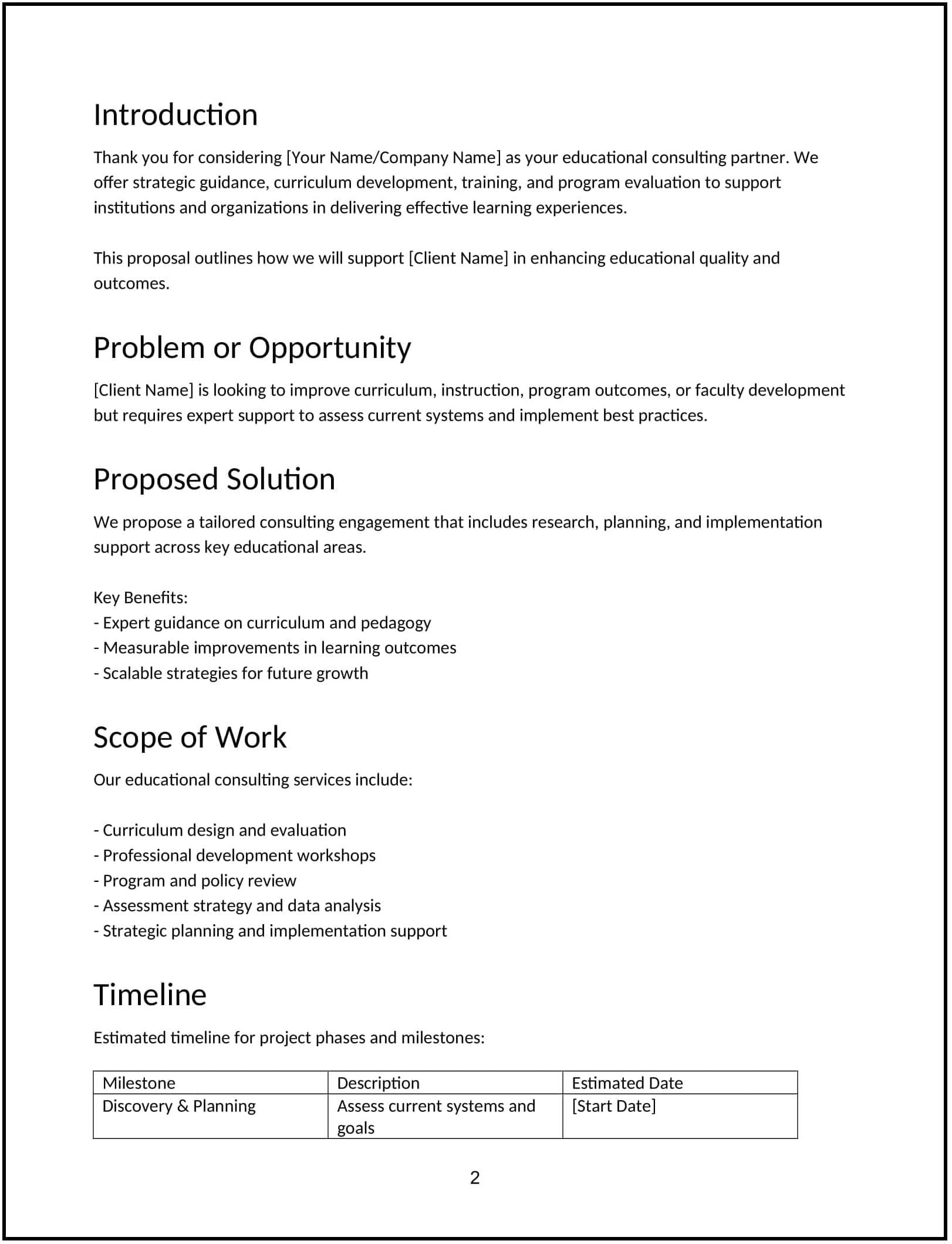Got contracts to review? While you're here for proposals, let Cobrief make contract review effortless—start your free review now.

Customize this template for free
Customize this free educational consulting proposal with Cobrief
Open this free educational consulting proposal in Cobrief and start editing it instantly using AI. You can adjust the tone, structure, and content based on your expertise, the client’s goals, and the scope of the engagement. You can also use AI to review your draft — spot gaps, tighten language, and improve clarity before sending.
Once you're done, send, download, or save the proposal in one click — no formatting or setup required.
This template is fully customizable and built for real-world use — ideal for pitching school improvement projects, academic program design, or strategic planning for education providers. Whether you’re creating proposals regularly or occasionally, this version gives you a structured head start and removes the guesswork.
What is an educational consulting proposal?
An educational consulting proposal outlines the services, strategies, and outcomes involved in a consulting engagement with a school, district, university, or education-focused organization. It's typically used by independent consultants or firms providing strategic advice, curriculum development, accreditation support, training, or policy recommendations.
These proposals help clarify what’s being offered, how it will be delivered, and what the expected results are. A strong proposal also supports decision-making by stakeholders who need to assess the value and fit of the proposed work.
Educational consulting proposals help you:
- Define the project scope and outcomes clearly for educators and administrators.
- Establish timelines and methods for delivery, collaboration, and reporting.
- Position your experience and methodology credibly in an academic context.
- Support internal approvals by providing clarity and structure.
This proposal is ideal for anyone offering advisory services in the education sector and looking to formalize their approach in a professional, persuasive way.
Why use Cobrief to edit your proposal
Instead of wrestling with formatting in Word or Docs, Cobrief helps you build and polish your proposal in-browser — with AI support at every step.
- Edit the proposal directly in your browser: No setup needed — just open the template and start editing.
- Rewrite sections with AI: Instantly adjust tone, simplify dense language, or expand key ideas with smart prompts.
- Run a one-click AI review: Surface unclear phrasing, inconsistent structure, or missed details instantly.
- Apply AI suggestions instantly: Apply changes section-by-section or implement all improvements in one click.
- Share or export instantly: Send a live link or download a clean, professional PDF or DOCX version.
Cobrief helps you save time, improve clarity, and make your proposal stand out — especially in academic or government settings where precision matters.
When to use this proposal
This educational consulting proposal is ideal for situations such as:
- Proposing curriculum development or redesign for K–12 or higher education.
- Recommending strategies for student success or retention initiatives.
- Supporting institutional accreditation or policy review processes.
- Providing faculty or staff training and development services.
- Offering evaluation, research, or data analysis consulting to education clients.
Use this template when you need to communicate your consulting scope, structure your offer, and help decision-makers say yes.
What to include in an educational consulting proposal
Each section of this proposal template is designed to communicate your offer clearly and credibly. Here's how to use them:
- Executive summary: Summarize the consulting project in a few short paragraphs. Focus on the problem being solved and how your services will deliver meaningful outcomes (e.g., “Increase student engagement through a redesigned STEM curriculum”).
- Project scope: Define exactly what services you’re offering — whether strategic guidance, research, training, curriculum design, or policy analysis. Be specific about what’s included and what isn’t.
- Objectives and outcomes: Outline the goals of the engagement. What will success look like? How will progress or results be measured?
- Methodology: Briefly explain your approach. This might include needs assessment, stakeholder interviews, co-design processes, or data-driven analysis.
- Timeline: Break the project into phases and include key milestones and expected delivery dates.
- Consultant profile: Share your qualifications, relevant academic or policy experience, and past client results. Tailor this to the audience — often school boards or administrators.
- Pricing: Present your fees clearly. Break down by phase, day rate, or package — whatever makes your offer easiest to understand and approve.
- Terms and conditions: State payment terms, cancellation policy, and intellectual property ownership in plain language.
- Next steps: Make it easy for the client to proceed — e.g., “Reply to confirm” or “Click to schedule a kickoff meeting.”
How to write an effective educational consulting proposal
To be persuasive, your proposal needs to show insight into the institution’s goals — not just your qualifications. Here’s how to strengthen it:
- Connect to institutional priorities: Frame your offer in terms of outcomes like accreditation readiness, student performance, or policy alignment.
- Use familiar language: Reflect terminology used in the brief, RFP, or earlier meetings — especially when dealing with educational boards or committees.
- Show impact, not just process: Reference past successes or data when possible (e.g., “Helped reduce dropout rates by 12% across 3 schools”).
- Be clear and structured: Administrators may share this with other stakeholders — make it easy to follow and skim.
- Avoid vague promises: Spell out what’s included, what’s not, and how you’ll collaborate.
- End with a clear next step: Leave no doubt on what to do if they’re ready to move forward.